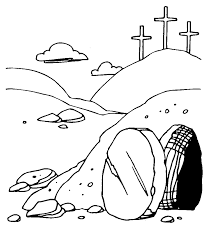John 20:1 – Now on the first day of the week Mary Magdalene came to the tomb early, while it was still dark, and saw that the stone had been taken away from the tomb.
Our last post ended with the death and burial of Christ but, hallelujah, the story does not end there for Jesus has risen!

In the prior chapter, John recorded five witnesses who each independently testified that Jesus was truly dead. Now he will give us the eye witness accounts of multiple people who saw Jesus alive and who would testify that he had risen from the dead.
This is absolutely critical because Jesus' resurrection from the dead was the ultimate proof that he was the Messiah. Those who would not believe any other evidence were referred to the sign of the prophet Jonah, who was in the belly of the whale three days and three nights (Matthew 12:39-40).
Furthermore, Jesus went to the cross to pay the full price for our redemption – the price which was set by Father God. If Jesus dies for us but never rises again, the only conclusion we can reach is that God did not accept his sacrifice and that we are still in our sin.
So these eyewitness accounts are vitally important.
The first witness to the resurrection is Mary Magdalene.

Mary was a faithful believer/follower of Jesus. Scripture tells us that Jesus cast seven devils out of her (Mark 16:9). From then on, she (and other women as well) traveled around with Jesus and the apostles, ministering to them in many ways, but particularly by assisting them financially (Luke 8:1-3).
John informs us that on the first day of the week, Mary Magdalene came to the grave while it was still dark. We cannot help but notice the faithfulness of Mary.
- She was with Jesus as he traveled around, preaching the gospel.
- She was there for his crucifixion, even though his disciples had fled in fear (Mark 15:40, Luke 23:49).
- She was present when Jesus was laid in the tomb by Nicodemus and Joseph (Matthew 27:61, Mark 15:47).
Now she (along with Salome and the 'other' Mary/mother of James) faithfully and courageously goes to the tomb fearing neither the guards nor the dark of night.� Her only concern is how to move the enormous stone that blocked the entrance (Mark 16:3).
Her purpose in going to the tomb was two-fold. One reason was to bring more spices to anoint the body (Mark 16:1-2), while paying her final respects. The second was to weep and mourn for the death of the Savior.
But as she arrives at the tomb, John tells us that she finds the stone 'taken away' from the tomb. Let's take a moment to review this, since John did not include the sealing of the tomb in his account of the death/burial of Christ.
In the gospel of Matthew (27:62-66), we find that on the day immediately following the day of Preparation, the chief priests and Pharisees once again approached Pilate asking for a favor.
They tell the governor about Jesus' prophesy that he would die and rise again on the third day. The Jewish leaders are deeply concerned about the possibility of the disciples stealing his body and 'pretending' that he had risen. They were very fearful that if this rumor ever got started, they could never stop it.
So with Pilate's support, they placed a seal upon the stone which served as the door to the tomb. In addition, they stationed a number of Roman soldiers at the entrance to stand guard. They were determined to prove that Jesus was dead and he wasn't coming back.
Yet, according to all the gospel writers, when the women arrived at the tomb, they find the guards gone and the stone rolled away!
John 20:2 – So she ran and went to Simon Peter and the other disciple, the one whom Jesus loved, and said to them, "They have taken the Lord out of the tomb, and we do not know where they have laid him."
As usual, we find that John does not feel the need to mention every single detail of the events he records, especially things noted by the other gospel writers. The purpose of his account of the resurrection is to establish the fact that Jesus had risen, and to depict the gradual dawning comprehension and faith of Christ's followers as they realize he has risen from the dead.
So, when Mary comes to the tomb, she is surprised to find the guards gone and the stone rolled away from the entrance. As she investigates, she finds the body of Jesus gone. Soon other women arrive and they too confirm that the body is gone.

As we know, Jesus plainly told his followers multiple times that he would be crucified and rise on the third day (Matthew 20:19, Mark 9:31, Luke 18:33, etc). But despite this fact, when the women find the tomb empty, they are bewildered and perplexed. They assume that the body has simply been moved.
Specifically, they believe that either someone has moved it from its temporary grave to a new tomb (perhaps Joseph or Nicodemus), or the body has been stolen by the enemies of Christ.
In bewilderment and alarm, they abandon the useless spices and immediately go to report this news to the disciples.
John 20:3-5 – So Peter went out with the other disciple, and they were going toward the tomb. Both of them were running together, but the other disciple outran Peter and reached the tomb first. And stooping to look in, he saw the linen cloths lying there, but he did not go in.
It appears that the disciples were either lodging together just as they had done when Jesus was alive, or they were staying in very close proximity to each other. Regardless of which scenario is correct, we are relieved to note that Peter's denial had not cut him off from his fellow apostles. John had invited Peter into his home and the other disciples were also still associating with him.
In a state of fear and sorrow, Mary relates the news of the empty tomb to the disciples. Having seen the empty tomb, she is seized by despair. She interpreted the situation as dark and hopeless, but she is completely and utterly wrong! In reality, that empty tomb was pregnant with victory and promise!
The same is true for the seemingly dead places in your life. Whether it's a broken relationship, a financial need, a prodigal child or a physical ailment, know this: There is nothing our God cannot resurrect!
So don't lose hope when faced with a dark situation. View it as an opportunity for Jesus to do something miraculous. Sometimes God allows those things into your life in order to stretch your faith, or show you a new facet of his character.
After hearing Mary's report, the two men run to the tomb for a first-hand look at the situation. John is the younger man and as we would expect, he arrives at the tomb first.
Also as we would expect, he hesitates outside the grave because he is more timid and restrained than his colleague.
John 20:6-7 – Then Simon Peter came, following him, and went into the tomb. He saw the linen cloths lying there, and the face cloth, which had been on Jesus head, not lying with the linen cloths but folded up in a place by itself.
Peter, however, is as bold and impetuous as ever. Arriving at the tomb he brushes past John and immediately rushes inside.
Peter notices the face cloth (your translation may say napkin) neatly folded up and placed by itself. John did not see this at first, because it was only visible from inside the tomb.
However, both men were able to see the pile of grave clothes. This fact is noted by all four of the gospel writers, and well it should be, because the grave clothes are clear evidence that Christ had risen from the dead!
It is ridiculous to think that anyone, friend or foe, would have unwrapped the body before moving it.
If the body had been stolen by the religious leaders (or someone hired by them), they would certainly not have taken the time to unwrap a body that had been dead/decaying for three days. They would just have taken the entire thing and left the tomb as quickly and discretely as possible.
The same can be said of a friend who wished to move the body to a new grave – they would certainly not have dishonored Jesus by carrying his naked, decaying body through the streets of Jerusalem in order to bury it someplace else.
And in either case, there would be absolutely no reason to neatly fold the face cloth and separate it from the rest of the linen.
It is interesting to note that when Lazarus was raised from the dead, he exited the tomb still wearing his grave clothes, because at some point death would claim him again.
John 11:44 - And he that was dead came forth, bound hand and foot with grave clothes: and his face was bound about with a cloth. Jesus said unto them, Loose him, and let him go.
But when Christ rose from the dead he left his grave clothes behind him, because he no longer needed them – he would live and reign forevermore! Death no longer had power over him.
Romans 6:9 - Christ being raised from the dead dies no more; death has no more dominion over him.
And because of the power of Christ, death's dominion over us is only temporary. One day, when Jesus returns to earth, the dead in Christ shall rise to meet him in the air. They will be joined by those who are still alive and all of us will accompany Jesus to heaven (I Thessalonians 4:16-17). What a victorious day that will be!
John 20:8-9 – Then the other disciple, who had reached the tomb first, also went in, and he saw and believed; for as yet they did not understand the Scripture, that he must rise from the dead.
Once Peter enters the tomb, John follows. He too sees the empty tomb with the pile of grave clothes and he notices the neatly folded face cloth. The evidence clearly points to the fact that the body was neither stolen nor moved. But if that was the case, what had happened?
All of a sudden, John begins to remember and consider the words of Jesus – he would be crucified and then rise on the third day! The truth that John understood with his brain suddenly became truth he understood with his heart/spirit. Could it be that Jesus calmly and deliberately rose from death, freed himself from the grave clothes, neatly folded the face cloth and exited the tomb?
At this point, we witness the birth of John's faith - "he saw and believed". Seeing the grave clothes with his physical eyes brought sudden sight to his spiritual eyes.
Once this truth was birthed into his spirit, the other words/promises of Jesus also sprang to life. If Jesus had risen from the dead, just as scripture predicted, then the Messiah had come. The law had been fulfilled. Our high priest, the mediator between God and man, had taken up his office. Believers could now be reunited with God and saved from sin and death.
Hebrews 2:17 - Therefore in all things it behoved him to be made like unto his brethren, that he might be a merciful and faithful high priest in things pertaining to God, to make reconciliation for the sins of the people.
I imagine at that moment, John's head was spinning! But while John believed, Peter still seemed in the dark. The two left the tomb and returned home, no doubt discussing the situation on the way.
John 20:10-11 – Then the disciples went back to their homes. But Mary stood weeping outside the tomb and as she wept she stooped to look into the tomb.
For her part, Mary is utterly consumed with grief. She follows Peter and John back to the tomb, but when the disciples went home, she (and possibly the other women) remained at the gravesite, crying and mourning and searching for the body of Christ.

Who among us has not been in the place of Mary? This life is full of heartache; all of us are acquainted with grief and sorrow. And sometimes, like Mary, we find that family and friends cannot ease our burden or answer the questions we have deep in our hearts.
During those times, we should continue to seek the Lord, just as Mary did. He may or may not give us the answers we seek immediately (some questions must wait until eternity to be answered). But we know for sure that Jesus will meet us where we are, cut through our veil of tears, and bring us peace and comfort.
In the midst of her grief, Mary once again stoops to look into the grave (the same grave Peter and John had just left) only now there are two angels present.
John 20:12 – And she saw two angles in white, sitting where the body of Jesus had lain, one at the head and one at the feet.
It is uncertain whether Mary thought these were men, or if she knew they were angels. Their clothing would certainly have been a clue as angels often appear in bright white clothing (Acts 10:30, Matthew 28:3), which denotes purity and holiness.
But why are they sitting in the tomb, facing each other from opposite ends of the grave?
For one thing, the angels are no doubt contemplating the mystery of the love of God for mankind. As they look at the grave and consider the sacrifice of God, it must have revealed to them a depth of divine love that was completely unfathomable. How could God love man so much that he would die for us? What is man, that God would be mindful of him? It is a question that should astonish us too, and drive us to greater depths of praise and worship to our Lord.
Also, according to noted commentator Matthew Henry, the position of the angels denotes their careful observation and care of the body of Christ - they were literally in a position to watch over the physical body of Christ. Did they literally watch over the body of Jesus for the entire time it was in the grave? We can't say for sure.
But what we do know for sure is that the church is the 'body of Christ', and God has appointed angels to assist Christians here on earth:
Hebrews 1:14 -Are they not all ministering spirits, sent forth to minister to them who shall be heirs of salvation?
Therefore, it is correct to say that angels carefully observe and watch over the spiritual body of Christ or individual Christians.
Have you ever seen an angel? Has there ever been a time when you knew without a doubt that God sent an angel to protect or assist you at some point, even though you may not have seen them with your physical eyes?

Not only do angels assist and protect Christians, they also deliver messages and other words of comfort from God (Luke 1:19, Luke 1:26-38, Judges 13:2-14). This was the obvious reason they appeared to Mary and the other women at the tomb – to bring them the message that Christ had risen!
Here is something interesting to consider: As you may recall, the position of the angels in the tomb is the exact same position of the angels over the mercy seat (on the Ark of the Covenant), the place where God dwelt (Exodus 25:18-21). Back at that time, the angels prevented people from coming into the presence of God, but in the tomb they were welcoming/pointing people to the presence of Jesus, the way of life!
Yet another reason why two angels were dispatched to the grave is because scripture declares that legally it takes two witnesses to confirm something as truth:
Matthew 18:16 - But if he will not hear you, then take with you one or two more, that in the mouth of two or three witnesses every word may be established.
(See also Deuteronomy 17:6 and 19:15).
John 20:13 -They said to her, "Woman, why are you weeping?" She said to them, "They have taken away my Lord, and I do not know where they have laid him."
I do not believe the angel asked Mary this question in order to gain knowledge. He knew very well she was crying because she was distressed about the removal or theft of Jesus' body.
Rather, the question is a mild rebuke. Why is she crying, when she should be rejoicing? If Jesus said he would die and rise on the third day, then it was going to happen. In fact, it had happened!
But Mary does not comprehend the significance of the angel's comment. She is still completely focused on finding the physical body of Jesus.
John 20:14 – Having said this, she turned around and saw Jesus standing, but she did not know that it was Jesus.
The obvious question is why didn't Mary recognize Jesus?
Many explanations have been given. One says that Mary did not recognize him because she wasn't expecting him. She believed he was dead and her mind couldn't wrap itself around the idea that Jesus was still alive.
Another explanation is that because of her crying/watery eyes and the twilight of the day, she didn't see him clearly. The only person who would logically have been there at that time was the gardener, so she assumed it was him.
But the most likely answer is that God had placed a veil over her eyes, which prevented her from recognizing Jesus, just as he did to the two believers who walked with Jesus along the road to Emmaus:
Luke 24:15-1 - And it came to pass, that, while they discussed together and reasoned, Jesus himself drew near, and went with them. But their eyes were held that they should not know him.
Here is some exciting news: Jesus is about to reveal himself to Mary. And the spiritual parallel is clear – Jesus is found by all those who seek him (Jeremiah 29:13, Proverbs 8:17, Luke 11:9)!
John 20:15 – Jesus said to her, "Woman, why are you weeping? Whom are you seeking?" Supposing him to be the gardener, she said to him, "Sir, if you have carried him away, tell me where you have laid him, and I will take him away."
Again we note that Mary was looking at the situation through earthly eyes. Her one and only goal is to find the dead body of Jesus, so she can once again hide it away in the grave.
Although she was misguided, her words reveal the depth of love and devotion she had for Christ. She does not seem to take into account that Jesus himself probably weighed over 100 pounds and he was embalmed with another 75 pounds of spices. It is doubtful she could have actually moved his body anywhere by herself. But in her hunger and longing for Jesus, she declares that she will find a way to make it happen.
Wow! Wouldn't it be great if we felt the same way?

What if we were so in love with Christ and so desirous for his glory to be manifested on earth, that we would ask God to accomplish the impossible through us? Do we have the mindset that allows mountain-moving faith to work through us? If we desire to be that kind of Christian, then we need to take steps to make it happen.
- We must renew our minds with the word of God; we must believe that God is fully willing and capable of doing what he promises in his word.
- We must 'decrease' while allowing our devotion and desire for Christ to 'increase'. We have to let go of our own plans and desires in this world and allow God's desires to become our focus.
- We must stretch and grow our faith through constant use.
- We must be prepared to tackle and conquer problems and difficulties.
- We must be faithful, just as Mary was.
John 20:16 – Jesus said to her, "Mary." She turned and said to him in Aramaic, "Rabboni!" (which means Teacher).
With that single word, we witness the birth of Mary's faith. Hearing the master's voice with her physical ears brought sudden revelation to her spiritual ears. Jesus had risen!
With great joy she responds by addressing Jesus with a title of honor. By using the title 'Rabboni' Mary is acknowledging Jesus as both her teacher and master. She is professing her obedience and submission to Christ.
Do you remember what Jesus said to his followers in John chapter 10? He declared that the shepherd personally knows each sheep in his flock. He calls them by name, and they hear his voice and follow after him (John 10:3-5). This is exactly what happened to Mary in the physical sense.
It is also true in the spiritual realm as well. When Jesus first called us to himself through the conviction of Holy Spirit, we heard his voice and we responded. We accepted him as Lord and Master of our lives.
Jesus continues to speak to his people all the time. Have we sharpened our hearing so that we recognize his voice? Do we submit and obey when he calls us? If not, what steps can we take to change that?
John 20:17 – Jesus said to her, "Do not cling to me, for I have not yet ascended to the Father; but go to my brothers and say to them, "I am ascending to my Father and your Father, to my God and your God."
It is evident that upon recognizing Jesus, Mary immediately embraced him, and subsequently fell at his feet to worship him (Matthew 28:9). Having discovered him alive, she is so happy she can't let go of him. Jesus allows it for a brief moment, but then tells her to stop. Why would he do that?
The answer is that a change has taken place. Formerly, the earthly followers of Jesus (such as Mary) were accustomed to worshiping his physical presence. So Jesus allows her to briefly do so, in order that her faith might be activated and she might realize that he had risen from the dead.
But once that fact was established in her heart, she needed to make the change to worshiping Jesus in spirit and in truth – not in physical form (John 4:23-24). In another few weeks, Jesus was going to depart for heaven to sit beside his Father. After his ascension his followers could worship him as intensely and frequently as they desired.
We too must worship God in spirit and in truth. Instead of being led by Jesus in bodily form, Christians are now and will continue to be led by Holy Spirit until Christ returns to earth at the end of this age (Romans 8:14-15).
This concept is also included in the message that Jesus told Mary to give the disciples. She was to tell them that Jesus was shortly going to ascend to the Father, which meant they should not expect the continuance of his bodily presence on earth. They should also, once and for all, get rid of any dreams they held in regard to Jesus setting up an earthly kingdom to conquer Rome. He had not risen to remain on earth, but to return to heaven and receive the rewards of his labor – his office as the mediator between God and man.
In the meantime, Jesus commands Mary to give a message to the disciples - His Father is now their Father; his God was now there God. Because of the redemptive work of Christ, our relationship with God (which had been broken through sin) was now renewed and restored.
Notice that Jesus specifically addresses them as 'brothers'. Formerly he addressed them as friends, but now that his redemptive work is complete, they are family - children of God and joint-heirs with Christ (Hebrews 2:11-13), as are we.
What a wonderful honor Jesus has bestowed upon Mary – she is an eye witness to the fact that Jesus has risen from the dead. She can confirm that the prophesy given by Jesus shortly before his death has been fulfilled:
John 16:16 -A little while, and you shall not see me: and again, a little while, and you shall see me, because I go to the Father.
Her announcement of his resurrection no doubt brought great joy to the eleven, which was the fulfillment of yet another word spoken by Jesus:
John 16:20 -Verily, verily, I say unto you, That you shall weep and lament, but the world shall rejoice: and you shall be sorrowful, but your sorrow shall be turned into joy.
In the tumultuous events of the last few days the disciples had forgotten these promises, but now Jesus brings them to their remembrance through Mary.
Sometimes our lives can be tumultuous as well. During those times of trial, let us never forget the promises of God which are contained within his word.
John 20:18 – Mary Magdalene went and announced to the disciples, "I have seen the Lord" – and that he had said these things to her.
When the disciples last saw Mary, she was weeping and seeking the Lord. They could have stayed and searched with her, but instead they chose to go home.
But Mary was rewarded for her diligent searching – she had seen/found the Lord! Can you imagine the kind of relief and hope that must have surged through the disciples as they realized Jesus was risen? Her good news was a huge comfort and blessing to them in the midst of their darkest hour.
 Here is something to consider: God hasn't changed. He is still using his followers (you and me) to share the good news of the gospel to sinners. He is still using us to display his love and comfort to the hurting people of this world. It is our duty and privilege to tell them Jesus is alive!
Here is something to consider: God hasn't changed. He is still using his followers (you and me) to share the good news of the gospel to sinners. He is still using us to display his love and comfort to the hurting people of this world. It is our duty and privilege to tell them Jesus is alive!If you have lived through a struggle in this life, don't keep your victory to yourself. Share your testimony with others, so they too can find strength and comfort. Your story of victory gives others the strength and faith to overcome in their darkest hour too.
Let me offer you some encouragement and relief:
Mary Magdalene was a real mess when Jesus found her – she was possessed by seven devils. But Jesus totally transformed her life. He cast the devils out of her and allowed her (and several other women) to travel along with him and assist in his ministry.
Perhaps you are in a real mess right now. If so, let me give you some relief – God specializes in the impossible! Jesus is standing by right now to give you beauty for ashes (Isaiah 61:3); to transform your life and make you a new creation (II Corinthians 5:17).
And once he does, he has a special place of ministry for you, just as he did for Mary.
So don't keep that good news to yourself! I strongly encourage you to share your testimony with others! Scripture tells us that the ability to impart both life and death are in our tongues (Proverbs 18:21). Your testimony may be the very words of comfort and blessing that cause someone else to be victorious over Satan.
Let me offer you some strength:
In today's post we noted that when Christ rose from the dead he left his grave clothes behind him, because he no longer needed them – he would live and reign forevermore.
Once we accepted Christ as our savior, we passed from spiritual death to spiritual life (John 5:24). Therefore, physical death does not need to be a fearful or terrifying experience for us; it is nothing more than the portal through which we enter eternity and the presence of God!
The key to being peaceful and confident in death is to live your life for Christ right now!
